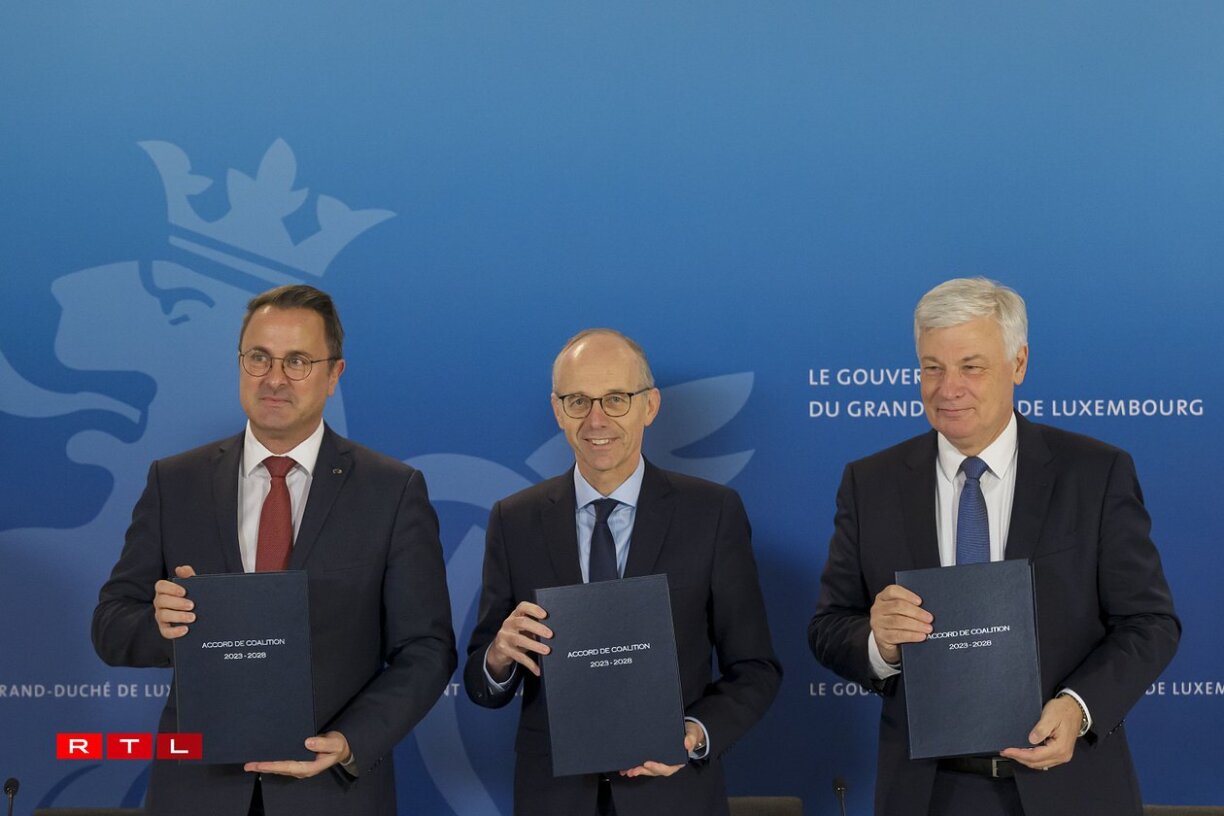
Thanks to exclusive early insights, RTL’s editorial team was able to conduct a first analysis of the coalition agreement (FR) signed by the Christian Social People’s Party (CSV) and the Democratic Party (DP) on Thursday. The document, which will guide the Frieden-Bettel government for the next five years, will be presented to the Chamber of Deputies on Monday.
Here is a list of key takeaways that will affect income, housing, healthcare, and family life.
Reinforcing purchasing power will be one of the main priorities of the CSV-DP government. The coalition promises additional measures and to maintain public investment “at a high level”.
A tax cut is to be applied retroactively to 1 January 2024, which will be done through an adjustment of the tax scale. This will be based on four index brackets: 2.5 were already in place while another 1.5 will be added. This represents a near 10% saving for all workers in Luxembourg.
Better still: if the government manages to keep its finances healthy, it promises to catch up with the four missing index brackets in the tax scale over the next five years.
The new government further vows to strengthen the participatory bonus scheme while also seeking to make the tax treatment of supplementary old-age pensions - one of the pillars of retirement in Luxembourg - more advantageous.
Further reading: Everything you need to know about pensions in Luxembourg
The CSV-DP coalition promises to carry out major tax reform over the coming years - a project introduced by the former government, but which never fully came to fruition, first delayed due to the pandemic and ultimately shelved when inflation and the energy crisis hit.
Now, the new government says it plans to present a bill establishing the single tax by 2026. Before then, however, Frieden promises that tax class 1A - which applies to single parents, widows, or widowers - will be reviewed to ease the tax burden on single earners.
Both parties oppose the idea of increasing the maximum tax rates for the highest income brackets. The new coalition also does not plan to introduce a wealth tax for individuals, or direct inheritance tax.

The new government remains committed to maintaining wage indexation in its current form; It will seek to limit the number of annual index tranches, with tripartite meetings with the trade unions required if there is to be more than one indexation per year. As with the previous coalition, the meetings will decide on measures to preserve purchasing power and business competitiveness. This could mean that measures taken to address the energy crisis, such as postponing indexations and compensating with tax credits, could become the norm.
The CSV-DP coalition desires to defend the value of work, and says in order to maintain a strong economy, there should continue to be a gap between benefits and minimum wage. “The minimum social wage must always remain higher than the Revis (state benefits),” states the agreement, although it emphasises the need for regular reviews to combat precariousness. “Working must remain more attractive than receiving benefits.”
The minimum social wage will continue to be scaled in line with other wages - currently this is reviewed every two years.
The last government made significant progress in terms of encouraging working from home, negotiating agreements with Luxembourg’s neighbouring countries to increase the tax threshold to 34 days per year for cross-border workers. The new coalition will continue to take the necessary steps to encourage teleworking for residents and cross-border commuters, albeit with a limit: “teleworking will be neither a right nor an obligation”.
Any plans to develop the home office concept in Luxembourg will also have to take into account respect for the right to disconnect from work.
Among the measures listed by the coalition agreement are several plans to target the housing and construction crises in Luxembourg. Several of these are limited measures designed to stimulate the construction market in the short term, such as a reduction in capital gains tax, an accelerated depreciation rate for rental housing, and an increase to the “Bëllegen Akt” tax credit, which will benefit buyers looking to purchase their main residence. The latter may also apply to individuals looking to invest in rental property.
Owners taking out property loans will also be permitted to deduct more annual interest when filing tax returns, in order to facilitate their credit without harming purchasing power.
Net income exemption will be increased to 90% for investors renting through social rental management organisations.
The government is also targeting unoccupied housing units, introducing a register to list empty homes, and plans to revise taxes both for empty units and land.
Young workers may also benefit from being exempt from premiums paid by businesses for the purpose of renting accommodation.
When it comes to healthcare, the CSV-DP coalition has adopted the adage “prevention is better than cure”. The public will be encouraged to make use of regular health screenings, which should be increased, and national prevention campaigns are to be reviewed and improved where necessary.
Regular health check-ups with a GP will be encouraged for people aged 30 and over. As for children, the government will prioritise the development of school medical services.
The coalition agreement also promises to create a legal framework “as quickly as possible” for medical companies to tackle routine care, and plans to facilitate the creation of medical practices throughout the country. It will also review plans to add urgent care centres (maisons médicales) in eastern and northern Luxembourg.

The government also plans to change the way Luxembourg’s hospitals collaborate, allowing them more freedom in terms of purchasing equipment - an issue which gained significant media attention over the past year as private medical establishments struggled to obtain authorisation to offer MRI scans. Ministers will be tasked with studying the possibility of creating new national services for specialised disciplines, under collaborative hospital management.
The new coalition seeks to increase the use of outpatient appointments outside of hospitals, in order to reduce wait times and journeys for patients, while concentrating hospital activities on emergencies and more complex treatments.
Other areas which could see development are home hospital treatments for oncology patients, high-risk pregnancies, or post-operation appointments. The cabinet will also study the advantages and risks for creating a potential birthing centre, situated near a hospital.
Finally, first aid and resuscitation training will be expanded.

The government plans to extend parental leave by an additional three months, in order to encourage more parents to stay at home with their children during the early years.
Maternity leave will benefit from more flexibility. Currently, expectant mothers are entitled to receive twenty weeks, composed of eight weeks for prenatal leave and 12 postnatal leave. Under the new agreement, women will have the option to convert up to six weeks of prenatal leave into postnatal leave, provided their obstetrician and employer agree.
Parents of children under the age of 13 will be able to negotiate unpaid part-time family leave with their employer, with up to four hours permitted per week.
Finally, parents approaching retirement age will be able to claim up to 36 months of “baby years” for their pension insurance, compared to the current limit of 24 months. The “baby years” will cover 36 months per child, with State contributions made up to the minimum social wage for the third year.
Adoption laws are set to be amended to reduce discrimination as per the new coalition agreement, allowing unmarried couples and single parents to adopt. The government will also amend the law to establish “automatic recognition of two parents of the same sex”.
Although surrogacy will still not be authorised in Luxembourg, children born to a surrogate abroad will be able to be recognised in the Grand Duchy, for both parents.
A new rate will be introduced for qualified childminders, to make the profession more attractive, while the law will also be adapted to create new rates for mini-crèches. The government also plans to consider the benefit of in-house childcare for businesses.
Further reforms are planned for childcare vouchers in order to harmonise funding, with consultations to take place with existing service providers.
The Luxembourgish language will be maintained as the common language in cycle 1 of primary school, with elements of linguistic awareness to be integrated. A generalisation of parallel German and French literacy at national level could be implemented as early as the 2026/2027 school year, following the evaluation of the current French pilot project in primary schools.
The agreement emphasises a need for scientific support and continuous evaluation of multilingual education.
Staff in childcare services will have access to specially-adapted Luxembourgish language courses for professional purposes.

One of the flagship measures announced on Thursday comprised the plan to create “local police units” within the Grand Ducal police force, with municipal mayors assuming authorisation over the units’ public order missions. In addition, the government will look into equipping police officers with tasers, as well as reviewing authorisation procedures for camera surveillance of public spaces.
The energy price cap is set to remain in place until 31 December 2024.
The government plans to introduce “pre-financing climate subsidies”, a type of third-party payment to encourage investments in clean energy. There will be a renewed focus on renovating buildings to comply with updated standards, with efforts to transition towards cleaner heating methods.
Companies will be encouraged to improve their energy efficiency through tax measures and subsidies.
Luxembourg will also invest in promising international projects, including offshore wind farms, or solar panel installations in southern Europe. Solar energy forms a key part of the new coalition’s energy policy, with the option for the State to install solar panels on the roofs of residential buildings.
To restore a sense of calm in smaller municipalities overridden by heavy traffic, the state aims to facilitate the creation of areas reserved for pedestrians and soft mobility, through the creation of 30 km/h and 20 km/h zones, as well as shared spaces.
“The creation of detour routes will be sped up as much as possible and the busiest areas will be prioritised” the coalition promises. This is how neighbourhoods could look like. Belval’s transformation provides a good example.
The Luxembourgish tram has been a “resounding success”, therefore the government wants to see any existing initiatives through. Here are the tram routes planned for Luxembourg City and the high speed tram planned between Luxembourg and Esch-sur-Alzette. Others routes will be assessed.
The government is delighted with the success of the Luxembourg-Saarbrücken route and wants to continue discussions for a rail connection with Saarland either via Konz or via Metz. To France, the government wants to increase the frequency of trains. Any necessary works have been underway for several years (for example a new Luxembourg-Bettembourg line, platform renovations and new train purchases in France, etc.).
Depending on the sector, certain buses will benefit from dedicated lanes, and high service level corridors will be “developed” on major routes. As far as possible, the government wants to cover all bus stops and extend the nightbus and nightrider offer for night owls.
The government is determined to develop a large network of national cycle paths “as quickly as possible”. The relevant authorities will be compelled to study the possibility of creating cycle paths parallel to new roads. And “secure cycle parking facilities will be installed wherever possible near all public buildings”.
Given the increase in the number of new road users, “a campaign to raise awareness of the Road Traffic Act will be conducted to make cyclists more aware of road traffic”.
To facilitate local travel and promote soft or alternative means of transport, users of bicycles and scooters will be able to make greater use of public transport, “even during rush hour”.